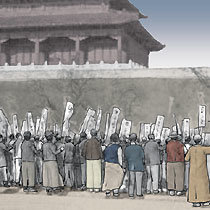Marking 100th anniversary of China’s May 4th Movement
Marking 100th anniversary of China’s May 4th Movement
Posted May. 04, 2019 07:55,
Updated May. 04, 2019 07:55

“The Declaration of Independence of Joseon should be put up on the gate of every school and mausoleum so that it can encourage us to fight against oppression, such as military dictatorship and foreign powers,” wrote Shanghai Shibao of the lessons from South Korea’s March 1st Independence Movement occurred two months earlier in its opinion of the May 4, 1919 edition. China’s May 4th Movement, which marks its 100th anniversary today, shares the same anti-Japanese and anti-feudal spirits with the March 1st Movement.
The May 4th Movement was sparked by China’s discontent with the decision made at the Paris Peace Conference, postwar peace talks, to give the colonial territory previously seized by Germany to Japan. This added fuel to the fury of Chinese, who had already been dissatisfied with the decision by Yuan Shikai, head of the Beiyang Army, to agree to the “Twenty-one Demands” by Japan. Some 3,000 Chinese students staged a mass protest at the Tiananmen Square on May 4 with the lead of Beijing University students. Some of them flocked to the house of Cao Rulin, Vice-Minister of Foreign Affairs of the Beiyang Government, and set a fire on the house, being infuriated by the picture of the emperor of Japan hung on the wall. The Beiyang Government arrested 32 students, who were involved in the incident. When the news got out, anti-Japanese and anti-government protests that started in Beijing spread nationwide.
At that time, Chinese people detested Japanese, calling them ghosts in Chinese, but were intimidated by them at the same time. Chinese, who once pitied Joseon for being colonized by Japan and at the same time despised the country for its corruption and incompetence, started to see the country differently after the March 1st Movement. According to Professor Bae Kyung-han of Pusan National University, China was supportive of the establishment of the Provisional Government of the Republic of Korea in Shanghai in April because of the March 1st Movement. Chen Duxiu, who founded the Chinese Communist Party, said, “Independence movement of Joseon is great and desperate, and marked an epoch in the history of revolution as it did not rely on force.”
The May 4th Movement is an event, where the public stood at the center of the history and expressed a sense of sovereignty, and the starting point of China’s modern history. The sense of sovereignty that arose from the May 4th Movement served as the foundation of the establishment of the Communist Party of China. In an event celebrating the 100th anniversary of the May 4th Movement on April 30, Chinese President Xi Jinping mentioned the word “patriotism” 19 times but did not say “anti-Japanese” in his speech in an apparent move to be on good terms with Japan. He did not mention another keyword “democracy” either as it runs counter to his effort to strengthen his power. The Communist Party of China, which marks 100th anniversary in 2021, should not tarnish the spirits of anti-imperialism and democracy.
Ja-Ryong Koo bonhong@donga.com







